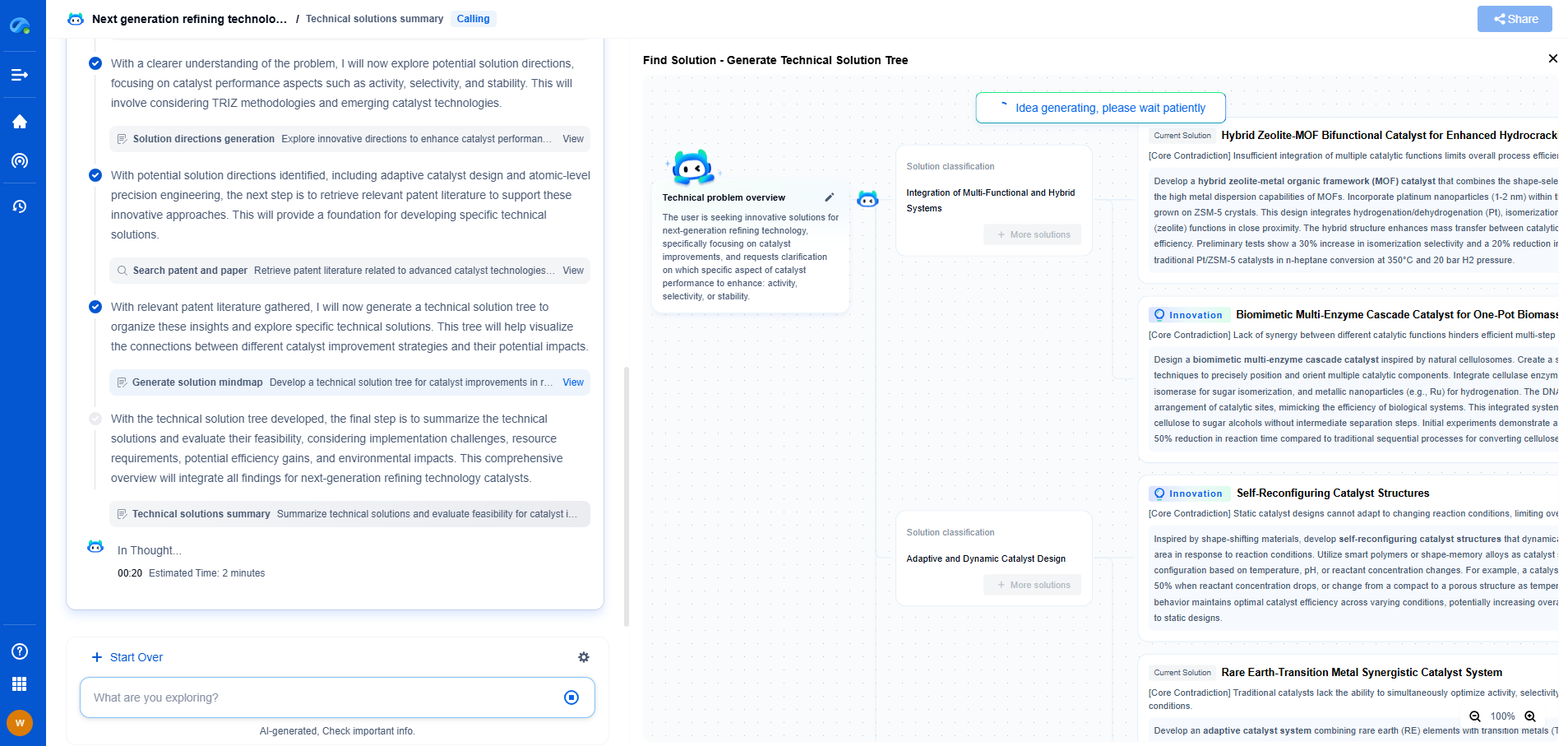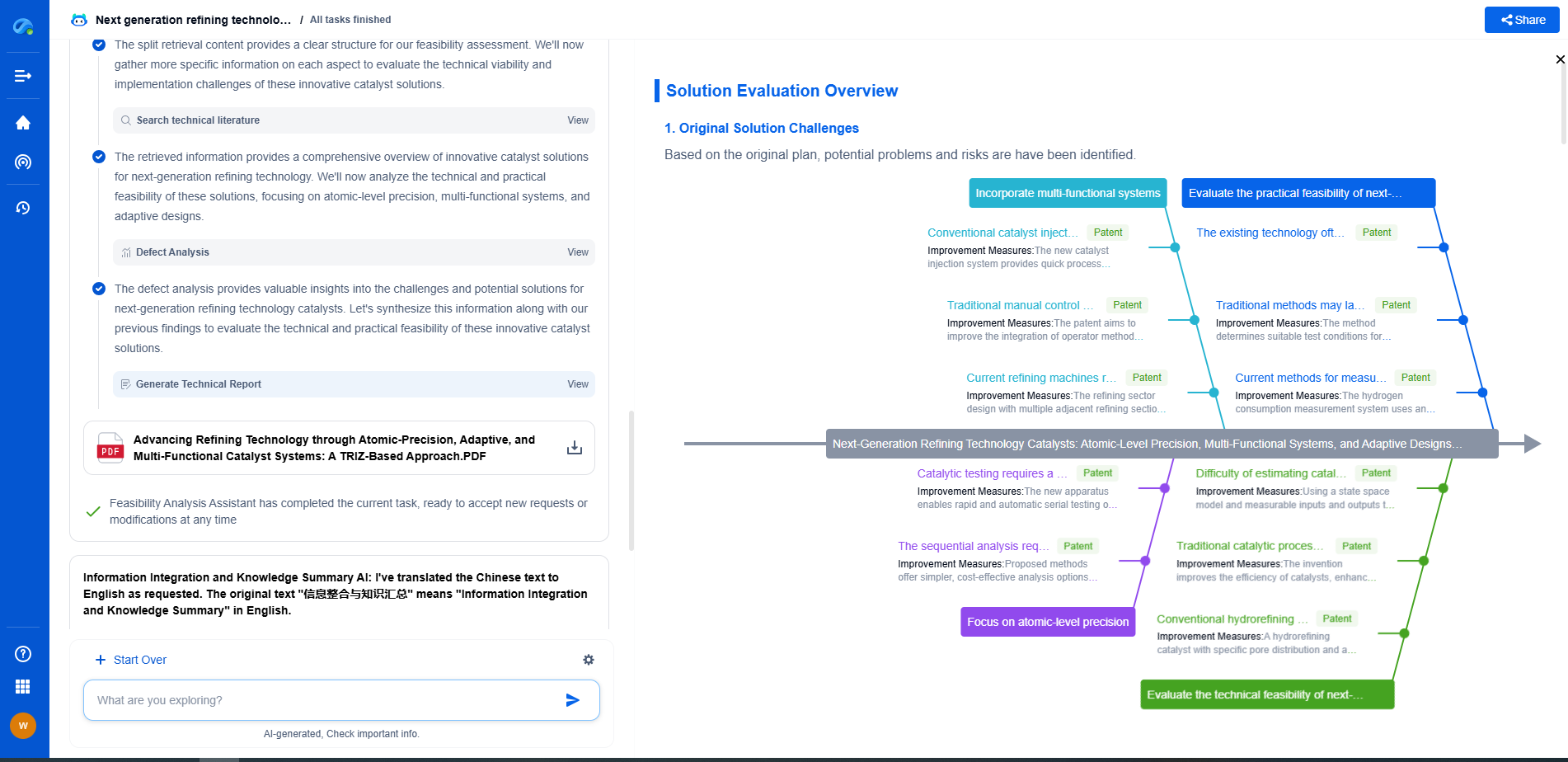Hydrogen Fuel Cells vs Diesel Generators: Backup Power Showdown
JUN 26, 2025 |
In today’s world, where continuous power supply is crucial for both businesses and households, reliable backup power solutions are more important than ever. Among the various options available, hydrogen fuel cells and diesel generators are two of the most popular choices. Each has its own set of advantages and limitations. In this article, we will explore the key differences between hydrogen fuel cells and diesel generators to help you make an informed decision regarding your backup power needs.
How Hydrogen Fuel Cells Work
Hydrogen fuel cells generate electricity through a chemical reaction between hydrogen and oxygen. This reaction occurs in a fuel cell stack, where hydrogen gas is introduced to the anode and oxygen from the air is introduced to the cathode. The hydrogen molecules are split into protons and electrons, which take different paths to the cathode. The electrons create an electric current, while the protons combine with oxygen to form water, the only emission from this process.
The Functionality of Diesel Generators
Diesel generators, on the other hand, rely on the combustion of diesel fuel to produce electricity. The engine burns diesel, which drives a generator to convert mechanical energy into electrical energy. Diesel generators have been long trusted for their robustness and reliability, particularly in off-grid locations or areas with frequent power outages.
Environmental Impact
One of the most significant differences between hydrogen fuel cells and diesel generators pertains to their environmental impact. Hydrogen fuel cells are widely regarded as a cleaner alternative, as their only byproduct is water vapor. This makes them an attractive option for those looking to reduce their carbon footprint and comply with stringent environmental regulations.
Diesel generators, in contrast, emit greenhouse gases and other pollutants such as nitrogen oxides and particulate matter. This has raised concerns over their long-term environmental sustainability and is a key factor driving the shift towards cleaner technologies.
Efficiency and Performance
When considering efficiency, hydrogen fuel cells often have an edge over diesel generators. They can achieve up to 60% efficiency in converting fuel to electricity, whereas diesel generators typically operate at around 30-50% efficiency. This higher efficiency means that hydrogen fuel cells can provide more power for the same amount of fuel, potentially reducing operational costs over time.
However, diesel generators have the advantage when it comes to power density and responsiveness. They can quickly ramp up to full power, making them ideal for situations where backup power needs to kick in rapidly during an outage.
Cost Considerations
The cost factor is crucial in determining the feasibility of backup power solutions. In terms of initial capital investment, diesel generators are generally less expensive than hydrogen fuel cell systems. They are also widely available and have a well-established supply chain, which can make installation and maintenance more straightforward.
Hydrogen fuel cells, while potentially more economical in the long run due to their efficiency and lower operational costs, require a higher initial investment. The infrastructure for hydrogen production and storage is also still developing, which can lead to additional costs and logistical challenges.
Versatility and Scalability
Diesel generators have long been favored for their versatility. They can be found in a range of sizes suitable for everything from small residential applications to large industrial sites. They are also relatively easy to scale, with multiple units often used in parallel to meet increasing power demands.
Hydrogen fuel cells, while traditionally more limited in application, are becoming increasingly adaptable. Advances in technology are enabling fuel cells to be used in a variety of settings, from residential backup power to large commercial systems. Their modular nature also allows for scalable solutions, although this can be more complex and costly to implement than simply adding diesel generators.
Conclusion
The choice between hydrogen fuel cells and diesel generators as a backup power solution depends on a variety of factors, including environmental considerations, efficiency, cost, and scalability. Hydrogen fuel cells offer a cleaner, more efficient alternative with potential long-term savings, but they come with higher upfront costs and infrastructure challenges. Diesel generators, while less environmentally friendly, provide a tried-and-tested solution with lower initial costs and greater versatility.
Ultimately, the decision will hinge on your specific needs and priorities. As technology continues to evolve, both options are likely to see improvements, offering even more viable solutions for backup power in the future.
Stay Ahead in Power Systems Innovation
From intelligent microgrids and energy storage integration to dynamic load balancing and DC-DC converter optimization, the power supply systems domain is rapidly evolving to meet the demands of electrification, decarbonization, and energy resilience.
In such a high-stakes environment, how can your R&D and patent strategy keep up?
Patsnap Eureka, our intelligent AI assistant built for R&D professionals in high-tech sectors, empowers you with real-time expert-level analysis, technology roadmap exploration, and strategic mapping of core patents—all within a seamless, user-friendly interface.
👉 Experience how Patsnap Eureka can supercharge your workflow in power systems R&D and IP analysis. Request a live demo or start your trial today.
- R&D
- Intellectual Property
- Life Sciences
- Materials
- Tech Scout
- Unparalleled Data Quality
- Higher Quality Content
- 60% Fewer Hallucinations
Browse by: Latest US Patents, China's latest patents, Technical Efficacy Thesaurus, Application Domain, Technology Topic, Popular Technical Reports.
© 2025 PatSnap. All rights reserved.Legal|Privacy policy|Modern Slavery Act Transparency Statement|Sitemap|About US| Contact US: help@patsnap.com

